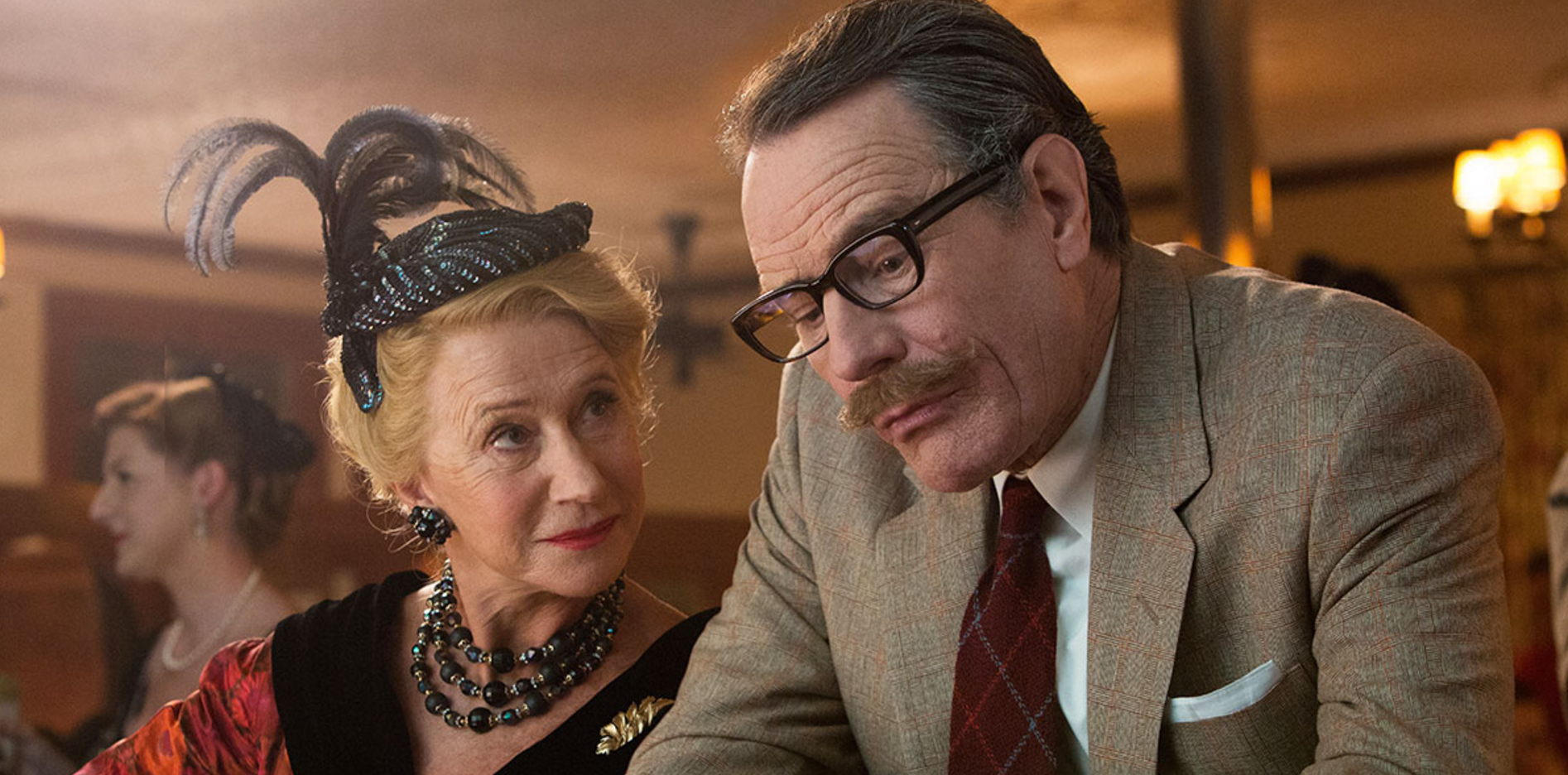Trumbo is an American drama starring Bryan Cranston in the role of Dalton Trumbo, an American screenwriter most famous for his struggle against the HUAC (House Un-American Activities Committee) after world war 2 because of his communist party ties. He is also famous for, kind of, being a two times Academy Award Winner for best writing (that’s what it was called at the time).
Unlike most movies who tackled the subject of communist scare in the backstage of hollywood in the 40’s and 50’s, this movie focuses on retaliation and defiance rather than humiliation and suffering. The movie carries a message of hope and resilience being armed with a true unbelievable story because A) It was indeed a tough struggle against employers and media at the same time and B) It is actually hard to believe that this story hasn’t been made into a movie until today; I mean, studios are currently fishing for true stories and it doesn’t even matter whether the story is of any significance … yes, I’m looking at you “Concussion”.
So by now we’ve established that “Trumbo” is actually refreshing, surprising, carrying good intentions and might’ve been a great movie if only it conveyed its message in better cinematic techniques. The film, unfortunately, feels a bit restricted by the profile of his own writer and the ambitions of its own director. The screenplay is written by John McNamara, a TV writer of such work as “Eyes” and “Fast Lane”, and “Trumbo” does feel like it was a TV project at some point, especially in the first half where I did feel like I’m racing towards the plot instead of proceeding towards it in a series of events.
During the first half of the movie, the viewer doesn’t get a chance to reflect on a certain event or even get engaged with characters and performances, one scene would start to tell a piece of the story and quickly twists into something else, mostly related with Dalton’s case taking a bad hit. It was clear to me that we’re racing towards the lowest point of the struggle and that quickly, luckily, happened with Trumbo getting jailed for contempt of congress .. No spoilers here, it’s all in the trailer.
Afterwards came the best chapter of the movie and that’s because of two things, 1) Trumbo’s fight changed its attention from trying to defend freedom of speech to trying to defend the right to work against the calls of boycott, and 2) John Goodman came along and portrayed the best character of the movie, one who has the clearest motives and the most logical goals, one who speaks business.
John Goodman’s character Frank King is the model I would like to use to exhibit the flaws in Helen Mirren’s character Hedda Hopper. As I followed how the film succeeded in making King a defender for the good side with the posters of cheap Class-D movies in his office, I also followed how Hopper was just being a bully. What I’m trying to say is that I would’ve loved to have me an interesting evil side!
The uninteresting evil side, the TV Movie feel and the documentary feel, yeah we’ll get to that in a second, are all dwarfed anyway by the performance of Bryan Cranston in the lead role. Dalton Trumbo might not be the best character of the movie. He has a temper that sometimes seem to extend beyond how short the movie makes us believe it is in the first half, and that felt a bit contradicting to me. I walked out of the movie believing that Trumbo was a genius, a true fighter, an inspiration, but I couldn’t really tell if he has anger issues or not! However, that never seemed to be a problem for Cranston, who landed his first, well deserved, Oscar nomination and maybe if it wasn’t his first, and maybe if his character had some sort of special need .. who knows?!
In his first project on the serious side, after movies like The Campaign, Dinner for Schmucks and Meet the Parents, Jay Roach delivers a rather fine job. The thing I enjoyed the most about the whole movie is how he presented the writer character; his workplace, his habits, his rituals .. That was all magic to me. McNamara’s writing didn’t help much, especially when we were able to detect the discrepancies between the quality of his own writing and the writings of the character that he was actually trying to write.
In the closing chapters of the film, Jay Roach slipped into a documentarian landscape. With characters like Kirk Douglas and Otto Preminger storming the screen and doing the exact same things that we could’ve enjoyed reading on a trivia page for the film. It had a nice feel to it, and it helped a lot with wrapping up the events and the story, but it also felt like Roach was focused on honouring the characters that helped during those dark times, and was also determined on shaming the ones who didn’t.
I would always love to spend 2 hours watching Bryan Cranston, a late bloomer who was never gifted with the facial features, the body or the voice, yet still always managed to deliver on all aspects. With him, Trumbo is a fun time and an enriching experience that is definitely worth your time.


